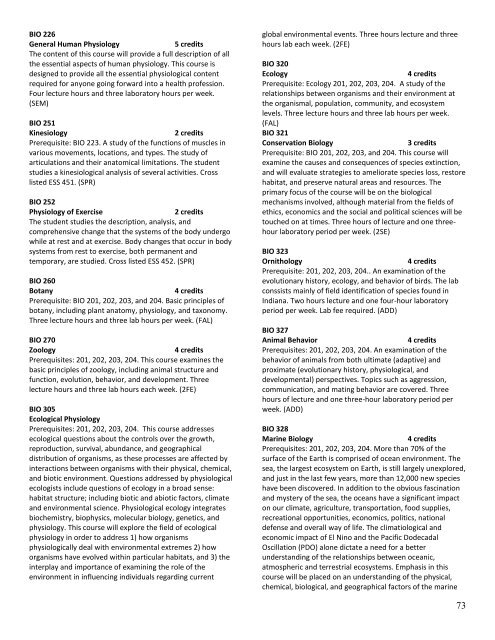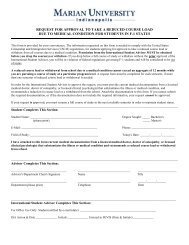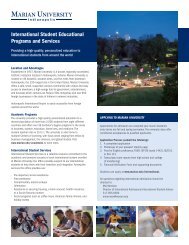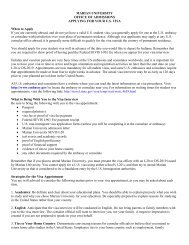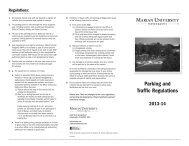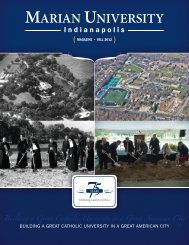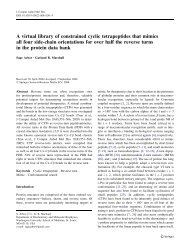2009-11 Marian University Course Catalog, fall 2010 edition
2009-11 Marian University Course Catalog, fall 2010 edition
2009-11 Marian University Course Catalog, fall 2010 edition
Create successful ePaper yourself
Turn your PDF publications into a flip-book with our unique Google optimized e-Paper software.
BIO 226<br />
General Human Physiology 5 credits<br />
The content of this course will provide a full description of all<br />
the essential aspects of human physiology. This course is<br />
designed to provide all the essential physiological content<br />
required for anyone going forward into a health profession.<br />
Four lecture hours and three laboratory hours per week.<br />
(SEM)<br />
BIO 251<br />
Kinesiology 2 credits<br />
Prerequisite: BIO 223. A study of the functions of muscles in<br />
various movements, locations, and types. The study of<br />
articulations and their anatomical limitations. The student<br />
studies a kinesiological analysis of several activities. Cross<br />
listed ESS 451. (SPR)<br />
BIO 252<br />
Physiology of Exercise 2 credits<br />
The student studies the description, analysis, and<br />
comprehensive change that the systems of the body undergo<br />
while at rest and at exercise. Body changes that occur in body<br />
systems from rest to exercise, both permanent and<br />
temporary, are studied. Cross listed ESS 452. (SPR)<br />
BIO 260<br />
Botany 4 credits<br />
Prerequisite: BIO 201, 202, 203, and 204. Basic principles of<br />
botany, including plant anatomy, physiology, and taxonomy.<br />
Three lecture hours and three lab hours per week. (FAL)<br />
BIO 270<br />
Zoology 4 credits<br />
Prerequisites: 201, 202, 203, 204. This course examines the<br />
basic principles of zoology, including animal structure and<br />
function, evolution, behavior, and development. Three<br />
lecture hours and three lab hours each week. (2FE)<br />
BIO 305<br />
Ecological Physiology<br />
Prerequisites: 201, 202, 203, 204. This course addresses<br />
ecological questions about the controls over the growth,<br />
reproduction, survival, abundance, and geographical<br />
distribution of organisms, as these processes are affected by<br />
interactions between organisms with their physical, chemical,<br />
and biotic environment. Questions addressed by physiological<br />
ecologists include questions of ecology in a broad sense:<br />
habitat structure; including biotic and abiotic factors, climate<br />
and environmental science. Physiological ecology integrates<br />
biochemistry, biophysics, molecular biology, genetics, and<br />
physiology. This course will explore the field of ecological<br />
physiology in order to address 1) how organisms<br />
physiologically deal with environmental extremes 2) how<br />
organisms have evolved within particular habitats, and 3) the<br />
interplay and importance of examining the role of the<br />
environment in influencing individuals regarding current<br />
global environmental events. Three hours lecture and three<br />
hours lab each week. (2FE)<br />
BIO 320<br />
Ecology 4 credits<br />
Prerequisite: Ecology 201, 202, 203, 204. A study of the<br />
relationships between organisms and their environment at<br />
the organismal, population, community, and ecosystem<br />
levels. Three lecture hours and three lab hours per week.<br />
(FAL)<br />
BIO 321<br />
Conservation Biology 3 credits<br />
Prerequisite: BIO 201, 202, 203, and 204. This course will<br />
examine the causes and consequences of species extinction,<br />
and will evaluate strategies to ameliorate species loss, restore<br />
habitat, and preserve natural areas and resources. The<br />
primary focus of the course will be on the biological<br />
mechanisms involved, although material from the fields of<br />
ethics, economics and the social and political sciences will be<br />
touched on at times. Three hours of lecture and one threehour<br />
laboratory period per week. (2SE)<br />
BIO 323<br />
Ornithology 4 credits<br />
Prerequisite: 201, 202, 203, 204.. An examination of the<br />
evolutionary history, ecology, and behavior of birds. The lab<br />
conssists mainly of field identification of species found in<br />
Indiana. Two hours lecture and one four-hour laboratory<br />
period per week. Lab fee required. (ADD)<br />
BIO 327<br />
Animal Behavior 4 credits<br />
Prerequisites: 201, 202, 203, 204. An examination of the<br />
behavior of animals from both ultimate (adaptive) and<br />
proximate (evolutionary history, physiological, and<br />
developmental) perspectives. Topics such as aggression,<br />
communication, and mating behavior are covered. Three<br />
hours of lecture and one three-hour laboratory period per<br />
week. (ADD)<br />
BIO 328<br />
Marine Biology 4 credits<br />
Prerequisites: 201, 202, 203, 204. More than 70% of the<br />
surface of the Earth is comprised of ocean environment. The<br />
sea, the largest ecosystem on Earth, is still largely unexplored,<br />
and just in the last few years, more than 12,000 new species<br />
have been discovered. In addition to the obvious fascination<br />
and mystery of the sea, the oceans have a significant impact<br />
on our climate, agriculture, transportation, food supplies,<br />
recreational opportunities, economics, politics, national<br />
defense and overall way of life. The climatiological and<br />
economic impact of El Nino and the Pacific Dodecadal<br />
Oscillation (PDO) alone dictate a need for a better<br />
understanding of the relationships between oceanic,<br />
atmospheric and terrestrial ecosystems. Emphasis in this<br />
course will be placed on an understanding of the physical,<br />
chemical, biological, and geographical factors of the marine<br />
73


